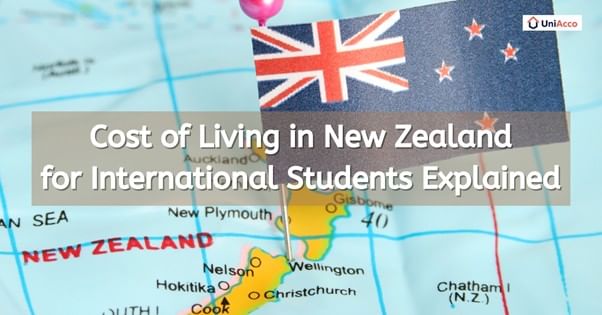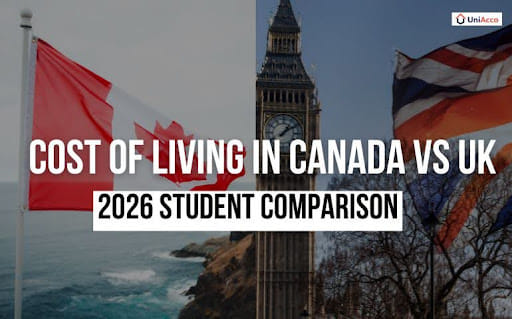You’re not just applying to study abroad—you’re planning your next five years, maybe your future. And New Zealand ticks a lot of boxes. Globally ranked universities. Safe cities. A clear post-study work path. But let’s address what could decide it for you: the cost of living in New Zealand for international students.
For most international students, the cost of living in New Zealand shapes the entire study abroad journey. It influences your housing choices, side hustle plans, and even your mental bandwidth from month to month. This blog lays it all out so you can move forward with full financial clarity.
Cost of Living in New Zealand for International Students
Key Insights About Living Expenses in New Zealand for International Students
Utilities take up the largest share of monthly expenses in New Zealand—almost twice as much as food and transport combined. That means your choice of student accommodation in New Zealand can make or break your budget.
Food, beverages, and transport are the next major expenses, so cooking at home and using public transport (or a good old bicycle) can help keep costs down.
Expenses like healthcare, communication, and clothing are relatively manageable. At the same time, miscellaneous and recreational costs hover in the mid-range—reminding you to set aside a little something for life beyond lectures.
On average, international students in New Zealand spend around NZD 700–800 per month (excluding tuition). Planning for NZD 10,000–12,000 a year will keep you covered for most living expenses.
Cost of Studying in New Zealand for International Students
Having planned to pursue your studies in New Zealand, you’re probably asking the big question: How much will it cost you? The answer depends on what you study, where you enrol, and the level you aim for—bachelor’s, master’s, or PhD.
Here’s a detailed look at the tuition fees across popular study levels in 2025.
- Undergraduate Courses in New Zealand
Most undergraduate degrees take 3 to 4 years to complete. Courses like medicine and engineering usually cost more than business or arts. Here’s a quick breakdown of average annual fees for Indian students:
| Program | Average Annual Tuition Fees (NZD) | Average Annual Tuition Fees (INR) |
| Arts and Humanities | NZD 22,000–30,000 | ₹11,00,000–₹15,00,000 |
| Business and Management | NZD 25,000–35,000 | ₹12,50,000–₹17,50,000 |
| Engineering and Technology | NZD 30,000–40,000 | ₹15,00,000–₹20,00,000 |
| Medicine and Healthcare | NZD 35,000–70,000 | ₹17,50,000–₹35,00,000 |
| Sciences | NZD 26,000–35,000 | ₹13,00,000–₹17,50,000 |
| Medicine is the most expensive course group. Business and arts are usually easier on your budget. |
- Postgraduate Courses in New Zealand
Master’s degrees in New Zealand usually last 1 to 2 years. Most programmes focus on research and real-world application—great for building skills and career-ready experience. Here’s what you can expect to pay per year in 2025:
| Program | Average Annual Tuition Fees (NZD) | Average Annual Tuition Fees (INR) |
| Arts and Humanities | NZD 26,000–32,000 | ₹13,00,000–₹16,00,000 |
| Business (MBA/PGDM) | NZD 30,000–45,000 | ₹15,00,000–₹22,50,000 |
| Engineering and Technology | NZD 35,000–50,000 | ₹17,50,000–₹25,00,000 |
| Medicine and Healthcare | NZD 40,000–75,000 | ₹20,00,000–₹37,50,000 |
| Sciences | NZD 30,000–40,000 | ₹15,00,000–₹20,00,000 |
| Note: MBA courses usually cost more than general master’s programmes, especially in top-ranked universities. |
- Ph.D. Courses in New Zealand
This is where New Zealand stands out. As a PhD student, you pay the same tuition fees as domestic students—a major win if you’re looking at long-term research. Most PhD programmes run for 3 to 4 years.
| Program | Average Annual Tuition Fees (NZD) | Average Annual Tuition Fees (INR) |
| Arts and Humanities | NZD 6,500–9,000 | ₹3,25,000–₹4,50,000 |
| Engineering and Technology | NZD 7,000–10,000 | ₹3,50,000–₹5,00,000 |
| Sciences | NZD 7,000–10,500 | ₹3,50,000–₹5,25,000 |
| Business and Management | NZD 7,000–10,000 | ₹3,50,000–₹5,00,000 |
Cost of Accommodation in New Zealand for International Students:
When you move to New Zealand as a student, where you stay will shape both your routine and your budget. The cost of accommodation can vary depending on the city and the style of housing you choose.
- University Halls of Residence
If you prefer living on campus, university halls are a solid pick. They’re safe, social, and close to everything you’ll need. You can expect to spend between NZD 1,000 and NZD 1,500 per month—that’s roughly ₹50,000 to ₹75,000.
Meals and utilities are often included, which makes things a bit simpler.
- Shared Flats or Apartments
Want more freedom but still keen to save? Sharing a flat with fellow students can cut costs. You’ll likely spend NZD 600 to NZD 1,000 a month, or around ₹30,000 to ₹50,000.
Most shared homes don’t include meals, but you’ll have access to a full kitchen.
- Private Rentals
If you want more privacy, go for a place of your own. Just be ready to spend more. Renting a one-bedroom flat will cost you NZD 800 to NZD 1,300 per month—that’s ₹40,000 to ₹65,000, depending on the city.
Larger cities like Auckland and Wellington are usually more expensive.
| Quick Tip: If you’re on a tight budget, look beyond the city centre and explore suburbs near public transport. It could save you a decent chunk every month. |
Cost of Living in New Zealand for International Students: An In-Depth Explanation
Planning your monthly budget in New Zealand? You’ll need to account for food, travel, and health expenses alongside your tuition and rent.
Let’s look at what you’re likely to spend each month.
- Food and Grocery Expenses
If you cook often, you’ll save more than you think. Groceries cost around NZD 200 to NZD 400 monthly—about ₹10,000 to ₹20,000.
Prefer dining out? A meal at a regular restaurant can set you back NZD 15 to NZD 20—roughly ₹800 to ₹1,100 per outing.
A mix of home-cooked food and the occasional splurge usually works best.
- Transportation Costs
Public transport is well set up in most major cities. A monthly pass will cost you between NZD 100 and NZD 150—that’s ₹5,000 to ₹7,500.
However, students often get discounted fares. In Auckland, for instance, the AT HOP card gives you access to student discounts on buses, trains, and ferries.
You can also apply for a Student Card (NZD 20), which offers special deals on food, clothes, movies, and more.
| Expense Type | Approximate Cost (in NZD) |
| Monthly public transport pass | NZD 100 – NZD 150 |
| Cycle hire (per hour) | Around NZD 1 |
| One-way domestic flight | NZD 50 – NZD 70 |
| Petrol (per litre) | Roughly NZD 3 |
| Taxi base fare | Between NZD 3.5 and NZD 4.5 |
- Health Insurance
Health cover is a must while studying in New Zealand. It protects you from unexpected medical costs during your stay.
Most students choose StudentSafe, a widely accepted insurance plan that covers health and travel and costs around NZD 697 per year (roughly ₹34,000).
You must stay insured from the day you enrol until your student visa ends.
| Pro tip: Keep aside a little buffer for surprise spends. Living abroad always comes with a few curveballs. |
City-Wise Cost of Living in New Zealand for Indian Students
Thinking about where to live in New Zealand? The cost of living changes from one city to another. Big cities like Auckland and Wellington are usually more expensive. Smaller cities tend to be easier on your budget.
| City | Estimated Monthly Cost (in NZD) |
| Auckland | NZD 3,500 – NZD 4,000 |
| Wellington | NZD 2,500 – NZD 4,000 |
| Christchurch | NZD 2,500 – NZD 3,500 |
| Hamilton | NZD 2,500 – NZD 3,000 |
| Dunedin | NZD 2,000 – NZD 3,000 |
Smart Ways to Cut Living Costs in New Zealand (for Indian Students)
Let’s face it—every dollar matters when you’re studying abroad. The good news? You can keep costs in check without giving up comfort. Here’s how:
1. Start With a Solid Budget
Start by mapping out your fixed costs—rent, food, transport, mobile, internet, and any loan repayments. Use tools like Google Sheets or mobile apps such as Money Lover to track monthly expenses.
Tip: Always convert costs back to INR during your first few months. It helps you stay grounded when spending in dollars.
2. Choose Affordable Accommodation, Strategically
Student halls might offer convenience, but they’re rarely the most economical. Shared apartments—especially in areas outside the city centre—can reduce monthly rent by up to 30%.
For example:
- In Auckland, suburbs like Mt Roskill or Henderson offer better rental value.
- In Wellington, look into Newtown or Johnsonville.
Flat-sharing with other students also helps reduce utility and grocery costs.
3. Buy Groceries Like a Local
Supermarkets like Pak’nSave and Countdown are reliable, but you’ll stretch your dollar further at weekend farmers’ markets and ethnic grocery stores. Indian essentials—spices, rice, dal—are often cheaper in local Indian stores than in mainstream chains. Buy in bulk with flatmates to save more.
4. Use Public Transport to Your Advantage
Invest in a student travel card (e.g., AT HOP in Auckland, Snapper in Wellington). Monthly passes are far cheaper than daily fares. Walking or cycling for shorter distances isn’t just economical—it also cuts down on waiting times and transport delays. Used bikes are easily available on Trade Me or local Facebook groups.
5. Cut Down Utility Bills Without Compromising Comfort
Most homes in New Zealand lack central heating. Electricity bills can spike in winter. Use portable heaters with timers, insulate windows with temporary film, and dress in layers indoors to stay warm and reduce power use. For shared utilities, set a clear system with flatmates from day one. Avoid disputes with apps like Splitwise or Settle Up.
6. Handle Minor Repairs Yourself
You don’t need to be a handyman, but learning basic maintenance can save you hundreds. Simple tasks like replacing light bulbs, fixing a leaky tap, or cleaning the heater filter can easily be done with free online tutorials.
7. Split Costs and Share Responsibilities with Flatmates
Co-living isn’t just about lower rent. Shared grocery shopping, cooking rotations, and joint cleaning supplies can significantly reduce monthly costs. Just make sure financial expectations are clear from the start. A written agreement can prevent misunderstandings later.
Wrapping Up!
The cost of living in New Zealand for international students can feel like a deal-breaker. And when INR turns into NZD, the anxiety is real. But now, you’ve got the numbers. You’ve got the hacks. And more importantly—you’ve got clarity. That’s your edge.
The difference between stressing over every dollar and planning like a pro. Studying abroad doesn’t have to mean burning out. It can mean breaking through—if you’re ready to think smart, not just dream big.
And if you’re thinking smart, it starts with where you’ll live. Student accommodation is one of the biggest monthly costs, and locking it down early can save you both stress and money. UniAcco helps international students like you find the right home, at the right price, with zero drama. Because when your headspace is calm, your goals get louder.
FAQs
- Is New Zealand a good option for Indian students?
Yes. New Zealand is a safe, welcoming country with top-ranked universities and solid career prospects. Many Indian students choose NZ for its post-study work rights, quality of life, and globally recognised degrees. If you plan your finances well, the cost of living in New Zealand for Indian students is affordable with part-time work opportunities.
- How much money is required for a New Zealand student visa?
To get a New Zealand student visa, you need to show at least NZD 20,000 for one year or NZD 1,250 per month. This covers your basic living expenses in New Zealand as an international student. Factor this into your New Zealand living cost for international students while budgeting.
- Is living in New Zealand expensive for international students?
It depends on your lifestyle. On average, living expenses in New Zealand for international students range from NZD 20,000–25,000 per year. This includes rent, food, transport, internet, and other essentials. Costs vary across cities, but smart budgeting helps.
- What is the average cost of living in New Zealand for Indian students?
The cost of living in New Zealand for Indian students is typically NZD 1,500–2,000 per month. Accommodation, city, and personal choices affect this. Shared housing, student discounts, and cooking at home can lower your overall living expenses.
- Can international students get PR in New Zealand?
Yes, if you meet eligibility under the points-based system. Factors include age (under 55), English skills, NZ qualifications, and work experience. Many international students apply for PR after their post-study work visa.














0 Comments